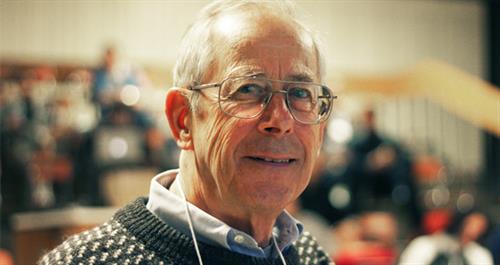By: Jon Farrow
10 Oct, 2019

A founding fellow of CIFAR’s Cosmology & Gravity program, Peebles’s work laid the foundation of modern cosmology.
Manitoba-born James Peebles, Albert Einstein Professor Emeritus of Science at Princeton University, was awarded the 2019 Nobel Prize in Physics “for contributions to our understanding of the evolution of the universe and Earth’s place in the cosmos.” He shares the award with Michel Mayor (University of Geneva) and Didier Queloz (University of Geneva & University of Cambridge), who won jointly “for the discovery of an exoplanet orbiting a solar-type star.”
Starting in the 1960s, Peebles developed theories about the basic structure and long-term history of the universe. He predicted the existence of Cosmic microwave background radiation and has been a leading theorist in areas of cosmology related to dark matter and dark energy. He was a founding member of CIFAR’s Cosmology & Gravity program in 1985, in which he remained actively engaged for more than 25 years.
“This is recognition of Professor Peeble’s landmark contributions to the understanding of the fundamental physics underlying the expansion of the universe,” says Dr. Alan Bernstein, President & CEO of CIFAR. “It is wonderful to see this year’s Nobel in Physics go to someone who has laid the foundation for modern cosmology.”
Peebles is the third Canadian to win a Nobel Prize in Physics in the last five years (including CIFAR fellow Arthur MacDonald), and the 20th researcher associated with CIFAR to win a Nobel Prize.
“Cosmically wonderful,” writes J. Richard Bond, CIFAR fellow and University Professor at the Canadian Institute for Theoretical Astrophysics (CITA) at the University of Toronto in a message to CIFAR. “Jim was instrumental in the beginning of CIFAR’s Cosmology & Gravity Program in the mid-1980s. His work exemplifies a lot of the CITA and CIFAR work in cosmology, dark matter, dark energy, cosmic microwave background, and the large scale structure of the universe.”
“The decades since the discovery of the cosmic microwave background radiation in 1964 have been a golden age for cosmology,” says Scott Tremaine, advisor in the CIFAR Gravity & Extreme Universe program and long-time collaborator with Peebles. “Our understanding of the geometry, evolution, and composition of the universe have been determined with extraordinary accuracy. There are few intellectual developments in these decades that Jim Peebles has not led or contributed to—the prediction of the cosmic microwave background, the understanding of the synthesis of the elements in the Big Bang, the discovery of dark matter, the description of the growth of large-scale structure, and so on.”
CIFAR is a registered charitable organization supported by the governments of Canada and Quebec, as well as foundations, individuals, corporations and Canadian and international partner organizations.